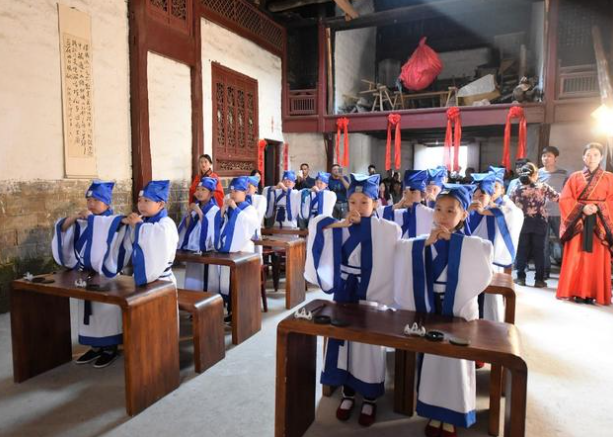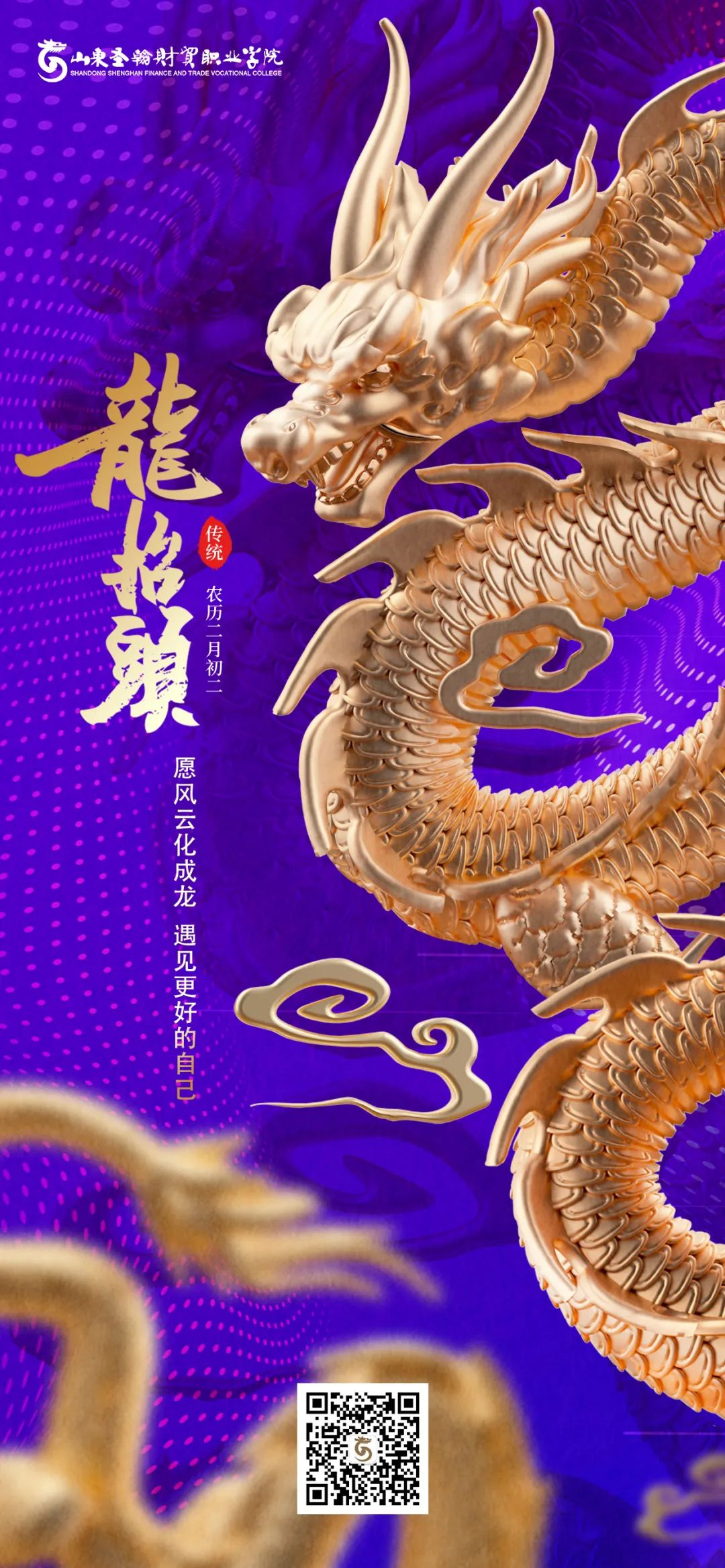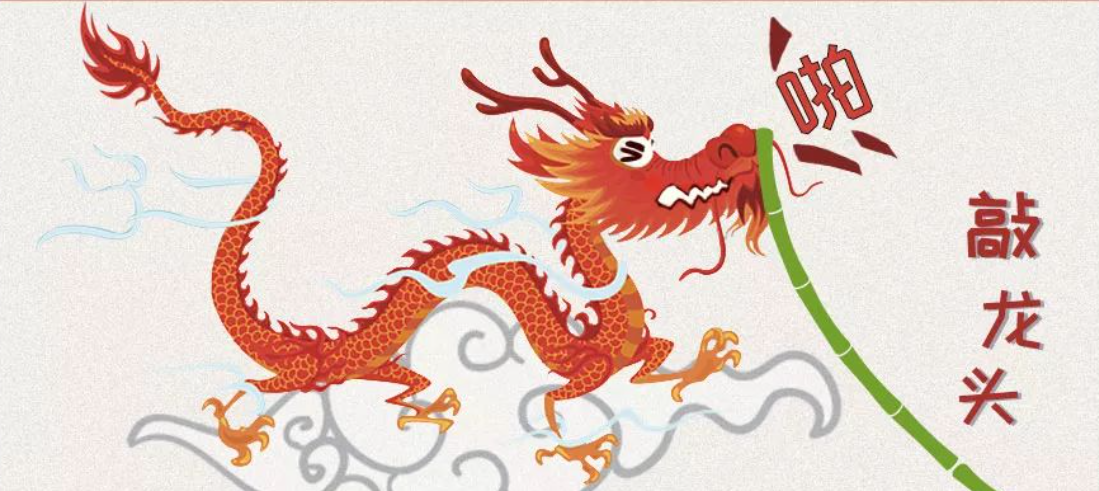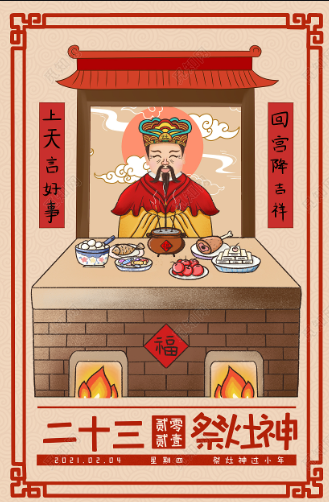发布日期:2024-03-20 14:06
On the second day of the second lunar month, the dragon rises up, also known as Spring Farming Festival, Agricultural Festival, Spring Dragon Festival, etc. It is a traditional Chinese folk festival of "respecting the dragon and praying for rain.". In ancient Chinese astronomy, the twenty-eight constellations were used to represent the position of the sun, moon, and stars in the sky and to determine the season. After the spring equinox, the "Dragon Horn Star" (i.e., the first and second stars of the Jiaoxiu constellation) appeared on the eastern horizon at dusk, hence the name "Dragon Head". On the second day of February, as the sun rises, all things revive like rain and oil. Every year, the night light is bright in the corner, and the year after year, we have a good harvest. Because "raising the head of the dragon" means the end of hibernation, the revival of all things, raising one's head and chest, and lifting one's eyebrows and breath, people have also regarded February 2nd as a day to bid farewell to the old and welcome the new, and bring good luck since ancient times! What are the auspicious and interesting customs on this day? Let's take a look together!
农历二月二,龙抬头,又称春耕节、农事节、春龙节等,是中国民间一个“敬龙祈雨”的传统节日。古代天文学方面,中国古代用二十八宿来表示日月星辰在天空的位置和判断季节,每到春分以后,黄昏时“龙角星(即角宿一星和角宿二星)”就从东方地平线上出现,故称“龙抬头”。二月二日头抬头,万物复苏雨似油。年年角宿光明亮,岁岁如意大丰收。因为“龙抬头”,就意味着结束冬眠、万物复苏、昂首挺胸,扬眉吐气的意思,故自古以来人们也把二月二这天,作为了一个辞旧迎新、转来好运的日子!那这一天有哪些吉祥有趣的习俗呢,我们一起来看看!

1. Breathing the dragon air
采龙气
In the morning (between 5 and 7 o'clock), It is the peak time of the Mao month and the Mao day. When going out, face east and take six deep breaths, meditate on a cloud of green energy descending from the Baihui acupoint on top of your head to the Dantian, filled with internal organs. The whole cloud of green energy envelops your body, and then walk a hundred steps towards the east. Smiling when encountering pedestrians on the road can attract wealth and prosperity. This is the first auspicious moment.
早上卯时(5点到7点之间),此乃卯月卯日卯时,出门面向东方深吸六口气,冥想一团青气从头顶百会穴下行至丹田,充满脏腑,整团青气包裹全身,然后步行向正东方走百步。路上遇到行人要微笑致意,可吸财气旺气。此为第一吉。

2. Shaving the faucet
剃龙头
As the saying goes, "Shaving the dragon's head on the second day of the second lunar month brings vitality throughout the year.". On this day, every hair salon is bustling with customers and thriving business. Children's haircuts, also known as shaving their heads, take advantage of the auspicious time when the dragon lifts its head to bless children with healthy growth and to get ahead of the pack in the future; When adults have their hair cut, it symbolizes bidding farewell to the old and welcoming the new, hoping to bring good omens and good luck.
民间谚说“二月二剃龙头,一年都有精神头”。每逢这天,家家理发店都顾客盈门,生意兴隆。儿童理发,叫剃“喜头”,借龙抬头之吉时,保佑孩童健康成长,长大后岀人头地;大人理发,则寓意辞旧迎新,希望带来好兆头、好运气。
3. Setting off dragon lanterns
放龙灯
The custom of "releasing dragon lanterns" still exists in the Yellow River Delta and some areas along the river. Many people use reeds or sorghum straw to tie into small boats, insert candles or place small oil bowls made of radish, and wait until evening to light them in the river or bay, creating a path for the dragon to shine. Through this entertainment, it also conveys a kind of good wishes.
黄河三角洲及一些沿河地区还有“放龙灯”的习俗。不少人家用芦苇或秫(shu)秸扎成小船,插上蜡烛或放上用萝卜挖成的小油碗,待到傍晩时分,放到河里或湾里点燃,为龙照路。借此娱乐同时又传递一种美好的祝愿。
4. Surrounding the granary
围粮仓
On the morning of the second day of the second lunar month, many villagers in northern regions wake up early. Housewives take out a basket of grass and wood ash from their own pots and stoves, and use a small iron shovel to shovel some grass and wood ash. They shake their hands and draw circles on the ground. The circle around the warehouse should be large and small, with three circles at most and five circles at most. It should be single but not double. After the warehouse is enclosed, the family grain is piously placed in the middle of the warehouse, and the meaning is spread on the outside of the warehouse, symbolizing the big harvest of that year.
农历二月初二清晨,北方很多地区的村民早早起床,家庭主妇从自家锅灶底掏一筐烧柴禾余下的草木灰,拿一把小铁铲子铲些草木灰,人走手摇,在地上画出一个个圆来。围仓的圆圈,大套小,少则三圈,多则五圈,围单不围双。围好仓后,把家中的粮食虔诚地放在仓的中间,还有意撒在仓的外围,象征当年的大丰收。
5. Worshiping the Kitchen God
祭灶
The southern "February 2nd" still follows the custom of sacrificing to the community. For example, in regions such as Zhejiang, Fujian, Guangdong, and Guangxi, there is a new "February 2nd" custom that is similar to the Dragon Head Festival and mainly based on sacrificing to the community. Mainly to worship the Earth God. The second day of the second lunar month is the birth day of the Earth God. The Earth God belongs to the local protection deity in folk beliefs. Worshiping the God of the Earth is also known as worshiping the earth. In modern times, it mostly means praying for blessings, ensuring peace, and ensuring harvest.
南方“二月二”仍沿用祭社习俗,如在浙江、福建、广东、广西等地区,既有类似龙抬头节习俗,又以祭社习俗为主的新“二月二”习俗。主要是祭祀土地神。农历"二月二"是土地公的诞生日。 土地神属于民间信仰中的地方保护神。祭祀土地神即祭祀大地,现代多属于祈福、保平安、保收成之意。
6. First Writing Ceremony
开笔礼
On the third day of February, it is Wenchang's birthday. Wenchang is the god of fame and achievement. The scholars worshipped Wenchang and sought to rank first in the imperial examination. On this day, they worshipped Wenchang to bless their children with success in their studies and high school in the imperial examination. The beginning of writing is the beginning of writing an article, and the ceremony mainly includes worshipping the statue of Confucius, teaching the most basic principles of life, and giving the Four Treasures of the Study as gifts. Many places have also resumed this activity now. Emperor Wenchang was in charge of the fate of exams and ruled over the achievements, fame, and wealth of scholars, and was even more popular among scholars than Confucius.
二月初三为文昌诞辰日,文昌是主宰功名之神,该日文人雅士敬奉文昌,求科举登第,在这天敬奉文昌神,让文昌神保佑孩子学业有成,科举高中。开笔就是开始写文章,仪式主要有拜孔子像、讲授人生最基本的道理,赠文房四宝等内容。现在很多地方也恢复了这项活动。文昌帝君掌理考试命运、主宰士子的功名利禄,比孔子还受读书人的欢迎。
7. Knocking the faucet
敲龙头
In some parts of Northeast China, on the morning of February 2nd, a long pole is used to strike the roof beam, which is called "knocking the dragon head",waking up the dragon in order to bless them. Adults and children are still reciting, "On February 2nd, the dragon raises his head, the big warehouse is full, and the small warehouse is so full that the cereals flow out."
东北部分地区在二月二早晨,以长竿击打房梁,谓之“敲龙头”。把龙唤醒,佑一方平安。大人小孩还念着:“二月二,龙抬头,大仓满,小仓流。”

8. drawing the fortune
引钱龙
Long controls water and water generates wealth. In some regions, it is common to attract money dragons on February 2nd, but the method of attraction is also slightly different. For example, some people place a few ancient coins or coins in a water bottle, go to a nearby well, a flowing river or a lake to fetch a pot of water, sprinkle it gently all the way back home, and pour the water and coins from the pot into the water tank, meaning that the dragon follows the water trail to the home; Some use copper coins to pull red thread and put it back home in a jar; Some use coal ash as a source of fortune.
龙司水,水润而生财。有些地区盛行在二月二这一天“引钱龙”,当然,引的方式也略有不同。例如有的在水壶里放置几枚古钱或硬币,到家附近的水井、流动的河或湖泊打一壶水,一路细洒着回到家,将壶里的水和硬币倒入屯水的缸里,意为龙循水迹引而至家;有的则用铜钱拉红线回家置于瓮中;有的则以煤灰为引钱。
Do these customs come from your hometown? What are your customs? Let's share it.
这些习俗有你家乡的吗?你们的习俗是什么?分享一下吧。




